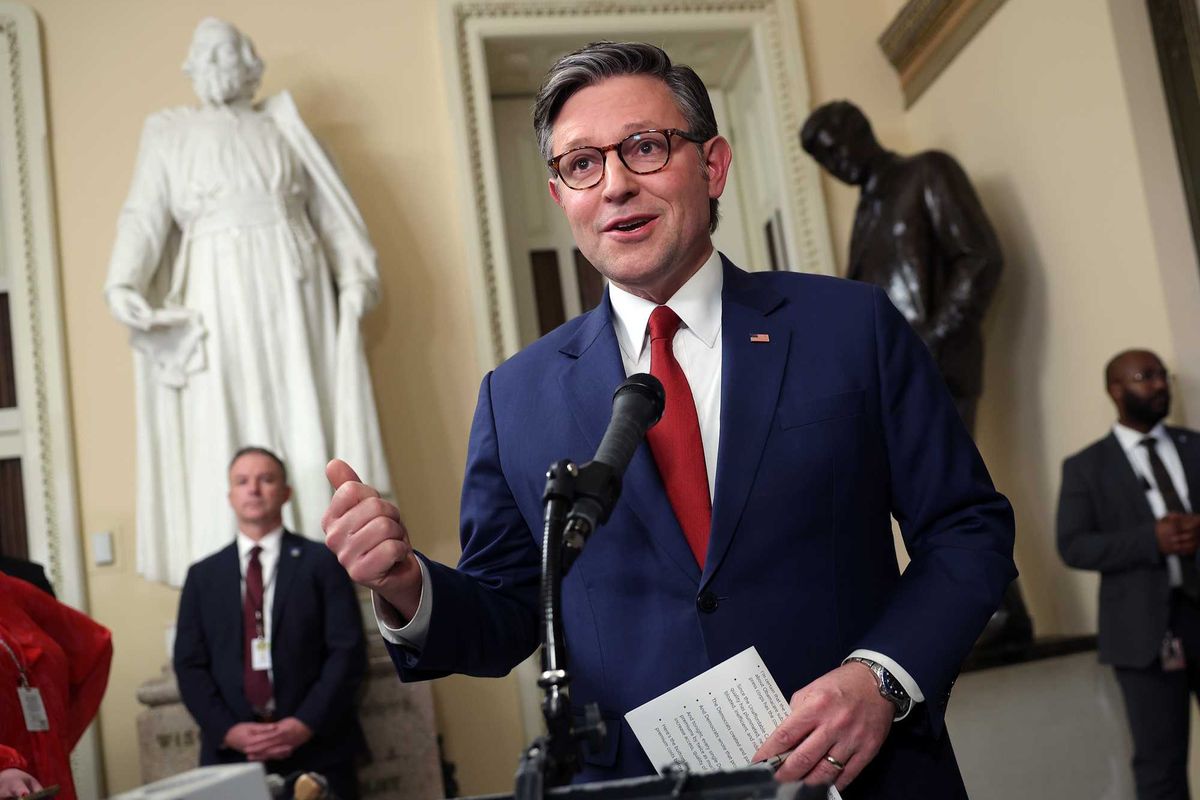News
Bridie Pearson-Jones
May 04, 2017

Picture:
Colin Woodward and Tufts/Brian Stauffer
Alexander Hamilton once called America "a great unfinished symphony" (or at least in the musical he did) - turns out he may have been onto something.
A new map has been created that will change the way you think of America.
The map, created by Brian Stauffer, based on the research of Colin Woodard, shows America divided up into 11 distinct nations instead off 50 states.
Woodard, an award-winning journalist, argues that...
The country has been arguing about a lot of fundamental things lately including state roles and individual liberty.
In order to have any productive conversation on these issues you need to know where you come from. Once you know where you are coming from it will help move the conversation forward.
These are the 11 nations.
Yankeedom
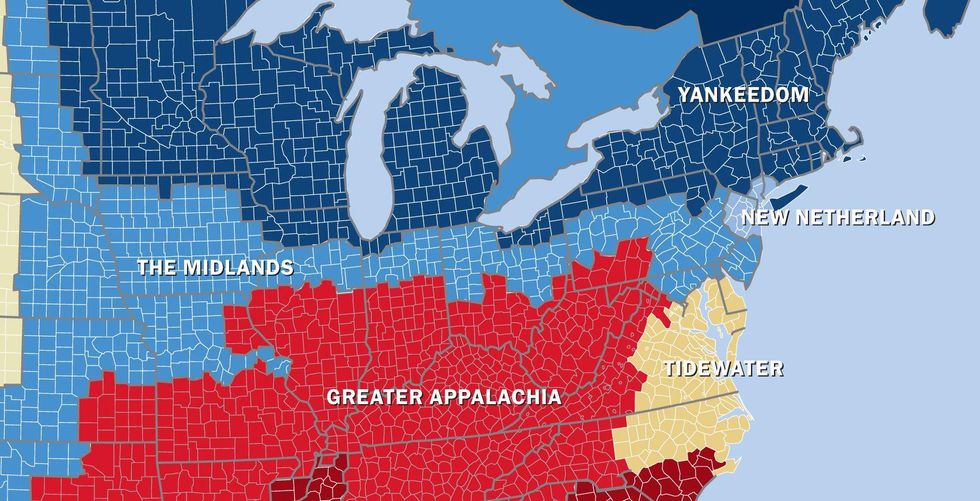
Yankeedom encompasses the Northeast above New York City and the and has since the outset put a "great emphasis on perfecting earthly civilisation through social engineering, denial of self for the common good, and assimilation of outsiders" according to Woodard.
He adds it has a "prized education, intellectual achievement, communal empowerment, and broad citizen participation in politics and government, the latter seen as the public’s shield against the machinations of grasping aristocrats and other would-be tyrants".
In other words, people from the North East are allegedly more comfortable with government regulation and value the common good over the individual (and tend to vote democrat).
New Netherland
It was only there for a short while, but New York was once a Dutch territory called New Amsterdam.
'New Netherland' which encompasses New York City and northern New Jersey is described as "materialistic, with a profound tolerance for ethnic and religious diversity and an unflinching commitment to the freedom of inquiry and conscience... It emerged as a centre of publishing, trade, and finance, a magnet for immigrants, and a refuge for those persecuted by other regional culture."
Tidewater
The coastal regions that tend to respect authority and value tradition. Includes English colonies of North Carolina, Maryland, Virginia and Delaware. This region was once the most powerful but began to decline during Westward expansion. It started as a feudal territory that embraced slavery.
The Midlands
Woodard describes the Midlands as "America's Great Swing Region". It was founded by English Quakers, who believed in humans' "inherent goodness," "welcomed people of many nations and creeds to their utopian colonies" and spawned the culture of the "America Heartland". It's an "ethnic mosaic" with a German rather than British majority. Like Yankeedom in people from the Midlands believe society should be organised to benefit ordinary people - yet in rejects top-down government intervention.
Greater Appalachia
Colonised by the Celts, Greater Appalachia has "been lampooned by the writers and screenwriters as the home of hillbillies and rednecks". Greater Appalachia, which was founded by those from the war-torn Scotland and Ireland shifted alliances during the American Revolution depending on who "appeared to be the greatest threat to their freedom".
Deep South
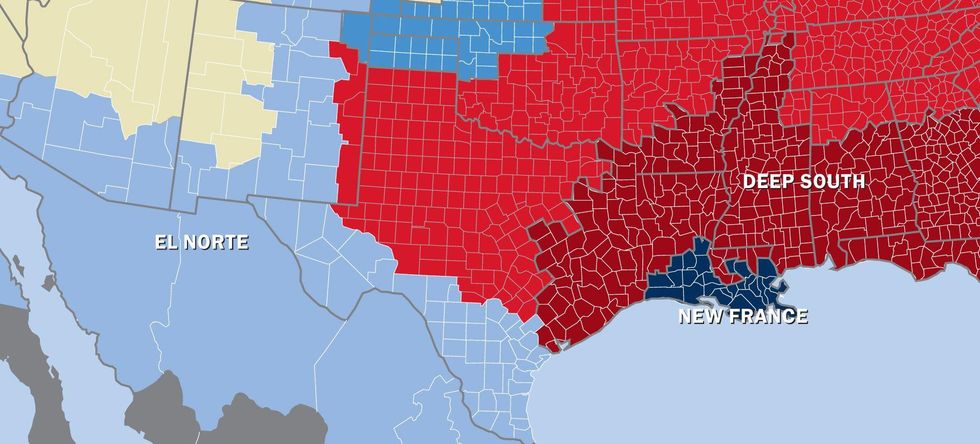
The Deep South was established by English slave lords from Barbados so was styled as a region with West Indies-style society. It has a rigid social structure and fights against "government regulation that threatens individual liberty" and "continues to fight against expanded federal powers, taxes on capital and the wealthy". Florida, Mississippi, Texas, South Carolina, Georgia and Alabama are all part of the Deep South.
New France
New France represents the unusual area in the Deep South that's actually quite liberal. Occupying two separate areas of New Orleans and Southeastern Canada. Woodard says it "blends the folkways of ancient régime northern French peasantry with the traditions and values of the aboriginal people they encountered in Northeastern North America". According to Woodard, the people that live there are the most liberal in the nation:
Its people have emerged as down-to-earth, egalitarian, and consensus driven, among the most liberal on the continent, with unusually tolerant attitudes toward gays and people of all races and a ready acceptance of government involvement in the economy
El Norte
El Norte is compromised of parts of Texas, Arizona, New Mexico, California and parts of Mexico and has a strong Hispanic culture and a high population of Spanish speakers. Woodard describes them as a "place apart" from the rest of America. The region values self-sufficiency, independence, and hard work.
The Left Coast
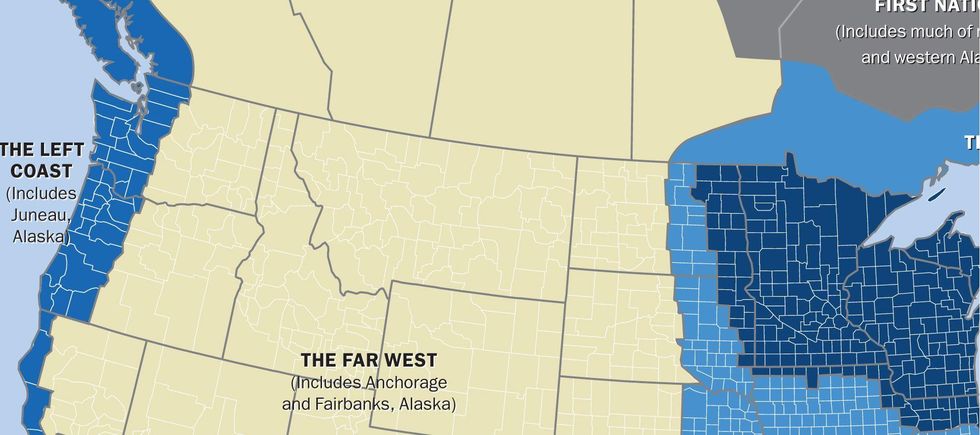
Coastal California, Oregon and Washington are all part of the "chili-shaped" Left Coast. Made up as a combination of people from New England and the Appalachian Midwest, the left-coast is described by Woodard as a combination of "Yankee utopianism and Appalachian self-expression and exploration".
The Far West
The Far West is the only part of the country that is shaped more by environmental factors (that are "high and dry") than the initial migrants that moved there. The almost inhospitable lands were tamed over many years by industrial resources such as irrigation systems, railroads, mines and dams. As a result, Far Westerners are often deeply suspicious of corporations and federal government. The states include all or parts of Nebraska, Kansas, Idaho, Montana, Wyoming, Utah, Washington, Oregon, North Dakota, South Dakota, Colorado, Nevada, Utah, Nebraska, Kansas, Arizona, New Mexico, and California.
First Nation
The First Nation is a huge sparsely inhabited territory inhabited by native American groups that never sacrificed their land to European settlers. The people live in harsh cultural climates, hence the population only being about 300,000. However they've retained cultural practices.
Speaking to Indy100 Woodard said that he's always been interested in the cultural differences of America.
I studied History at College and I was studying abroad in Budapest in 1989 and I witnesses the fall of communism. Living in Eastern Europe you really see the different groups of people with distinct cultures. When I got back to the US I realised it was the same, just no one was aware of it.
Woodard said that his map is based on "early settlement patterns" which are "profoundly different across the country".
The battle lines between these places are so intense - different settlement boards and the people profoundly disagree. Most Americans want freedom, but we have different ideas of what freedom is. Do we want small Government freedom or free community freedom? We're not one unitary state, we' all have very different views on culture.
Woodard adds that "stories about who you are can have a profound effect on your politics"
Cultural forces worldwide have a lot of inertia, and despite immigration and changing demographic we're surprisingly less slow to change our views.
If you look at a map of Yankeedom in 2008 or 2012 and 1916 it's exactly the same, it's just the counties have switched from Red to Blue.
Immigration to the US wasn't random, and migrants in the US have a lot more in common with the places they're going than the where they came from.
Red minorities move south, blue minorities go north. That's why blue states are getting bluer and red states and getting redder. We're not becoming a more purple country, we're becoming one with no in between.
This is strongly highlighted when you apply Woodard's boundaries over the 2016 election results.
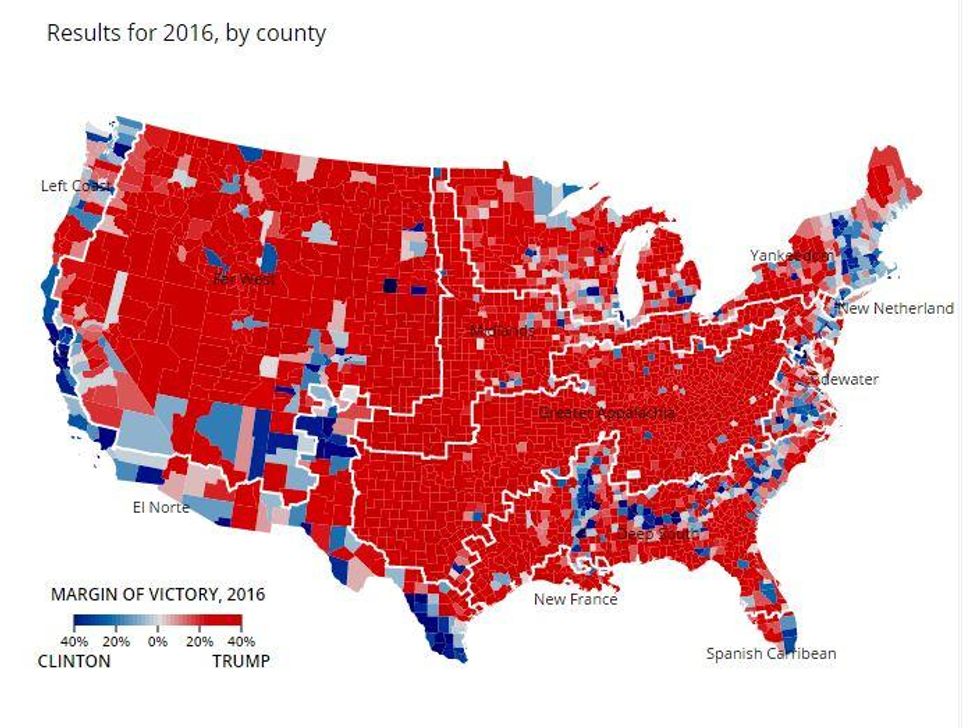
Click here for a high-res zoomable version of the map.
Picture: Colin Woodward and Tufts/Brian Stauffer
The map is published as part of journalist Woodward's new book, American Nations: A History of the Eleven Rival Regional Cultures of North America.
More: A map of the most stressed and most chill states in America
Top 100
The Conversation (0)










